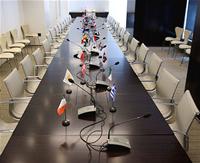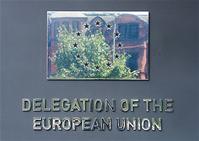A long-awaited summit - many unknown outcomes
Adelina Marini, August 23, 2010
 After almost ten years of efforts the European Union to start looking as an entity that could have a leading global role, it came up with the Lisbon Treaty, the ambition of which is to facilitate the communication among the 27 Member States. Or to put it more popularly - to create a single telephone number, to be used by anyone who wants to call the European Union. Whether exhausted of waiting or not satisfied with the result, the United States has not responded as in the past the former Secretary of State Henry Kissinger expected - to know whom to call in the European Union.
After almost ten years of efforts the European Union to start looking as an entity that could have a leading global role, it came up with the Lisbon Treaty, the ambition of which is to facilitate the communication among the 27 Member States. Or to put it more popularly - to create a single telephone number, to be used by anyone who wants to call the European Union. Whether exhausted of waiting or not satisfied with the result, the United States has not responded as in the past the former Secretary of State Henry Kissinger expected - to know whom to call in the European Union.
Everything started yet in November last year when, according to the Transatlantic agenda, the EU-US summit took place in Washington. The event passed on vaguely with more enthusiasm from Europe and more, as if, indifference from the US. The big hit, however, came in the beginning of 2010 when the White House canceled the planned regular summit that was to take place in Europe - in Madrid. The main reason was - again we are not sure whom to talk to. I (the President Barack Obama) come alone and you are three (the President of the European Commission Jose Manuel Barroso, the President of the European Council Herman van Rompuy and the president or prime minister of the country, holding the rotating presidency of the Union). And again - whom of the three of you should I talk to?
The diplomatic situation was more than awkward, especially against the  backdrop of EU's high expectations - now we have a president (Herman van Rompuy) and also a foreign minister (Catherine Ashton).
backdrop of EU's high expectations - now we have a president (Herman van Rompuy) and also a foreign minister (Catherine Ashton).
What is not right again?
The crisis with Greece that caused serious turbulences in the euro area, and also in the entire European Union, turned the Union inwards again. Until August 17 when all of a sudden, in the midst of the August vacations and heat, we received a press release that there will be a EU-US summit in Europe. The date is November 20 and the place - Lisbon.
Of course my first thought was what are they going to talk about. Here are the official announcements from Brussels and Washington, which indicate that the protocol of both sides acted in full synchronous. The announcement of the European Council says that President Herman van Rompuy and the President of the European Commission Jose Manuel Barroso will welcome the American head of state Barack Obama at a summit in Lisbon on November 20. The summit is taking place following an invitation of European leaders and (a very important detail) both sides have agreed for a mutually convenient date and venue. Then several sentences follow, explaining how the EU and the US work together around the world to secure progress on their common agenda, based upon shared history, culture and values.
The White House's announcement says almost the same but with a slightly different focus - the US has no stronger partner than Europe in advancing security and prosperity around the world. The US and the EU are continually working together to advance a broad agenda based on a common history, shared values, and enduring ties.
Find the differences
In spite that the style of writing varies slightly in both messages, practically both say the same thing - that both sides are committed to the sustainable growth of their economies, that they unite efforts in fighting terrorism, preventing the proliferation of weapons of mass destruction and promoting the ideals of democracy and human rights. The only difference is in the order of priorities. If the Europeans start with democracy and human rights, in the American announcement they are last. For the EU the economic cooperation with Europe is on the first place, while for Europe it is in the end. The second American priority is combating terrorism and weapons of mass destruction, followed by democracy and human rights.
 I don't know whether there is an intent invested in the order of the press releases and whether we could be certain in saying that such an order reveals in some way the priorities of both sides, but for sure what these messages lack is at least a scheme of the summit's agenda.
I don't know whether there is an intent invested in the order of the press releases and whether we could be certain in saying that such an order reveals in some way the priorities of both sides, but for sure what these messages lack is at least a scheme of the summit's agenda.
The second thing that makes one think deeply is the mentioning that the US and the EU have agreed upon a mutually convenient date and venue of the summit. On November 19 and 20 Lisbon will host the NATO summit, in the framework of which the EU-US summit will take place. Of course, it is natural during a crisis to save kerosene for Transatlantic flights, so quite expectedly the White House would try and do as much work as possible with only one flight. On the other hand, the wish of Barack Obama's administration to compensate an earlier refusal to come to Europe in spring shows that, no matter the sluggishness of taking decisions, the EU truely is the strongest economic partner.
Whether this is sufficient for Obama, since, again for economic reasons, he wants to end as soon as possible the US commitments in Iraq and to relieve burden in Afghanistan. However, the EU is not that excited with military problems, at least because at a European Union level there is no common army and the decisions for sending troops are left to each Member State alone. More important for Brussels is the moving forward of the clumsy European economy, if possible in one direction instead of 27.
Divided together
Purely in terms of statistics both foreign policy and economy show that Transatlantic relations are very good. Economic partnership is estimated to be worth 4.28 trillion dollars and is key for global economic prosperity. For this reason Transatlantic partners constitute half of global economy. With regard to foreign policy the EU and the US cooperate in many places around the world like the Middle East, Afghanistan/Pakistan, regional conflicts and other areas, but in a different way.
Another interesting fact is that the Belgian Presidency of the European Union is not mentioned among the participants in the summit in Lisbon. Usually the leader of the country, holding the rotating presidency of the Union, also takes part in such summits. In spring, if it had taken place, host of the summit in Madrid would have been the Spanish Prime Minister Jose Luis Zapatero. According to the two announcements, however, the only hosts in Lisbon would be the gentlemen Barroso and Van Rompuy.
A new beginning or a beginning of the end?
The first summit in this format after the entering into force of the Lisbon Treaty will take place on November 20. What will be the outcome, though, it is yet to be seen. More over in the framework of the NATO summit - an important detail, because for the US it is not a problem to put its economy and finances in order but for the EU this is yet to be solved. In the end of October in Brussels there will be an extraordinary European Council (the summit of the leaders of EU Member States), the ambition of which is to reach a consensus on the economic governance of the Union, laying the foundations of a common budgetary policy and, possibly, the initiation of a discussion about the introduction of common European taxes.
into force of the Lisbon Treaty will take place on November 20. What will be the outcome, though, it is yet to be seen. More over in the framework of the NATO summit - an important detail, because for the US it is not a problem to put its economy and finances in order but for the EU this is yet to be solved. In the end of October in Brussels there will be an extraordinary European Council (the summit of the leaders of EU Member States), the ambition of which is to reach a consensus on the economic governance of the Union, laying the foundations of a common budgetary policy and, possibly, the initiation of a discussion about the introduction of common European taxes.
It is also expected in the Autumn the new European External Action Service, headed by baroness Catherine Ashton to be completed and to start operation. Quite a lot of unknown quantities that prevent us from forecasting in what context the EU-US summit in Lisbon would take place and whether the White House administration would find it useful to continue such a form of communication with Europe or would wait again for a convenient moment to meet with its "strongest partner".